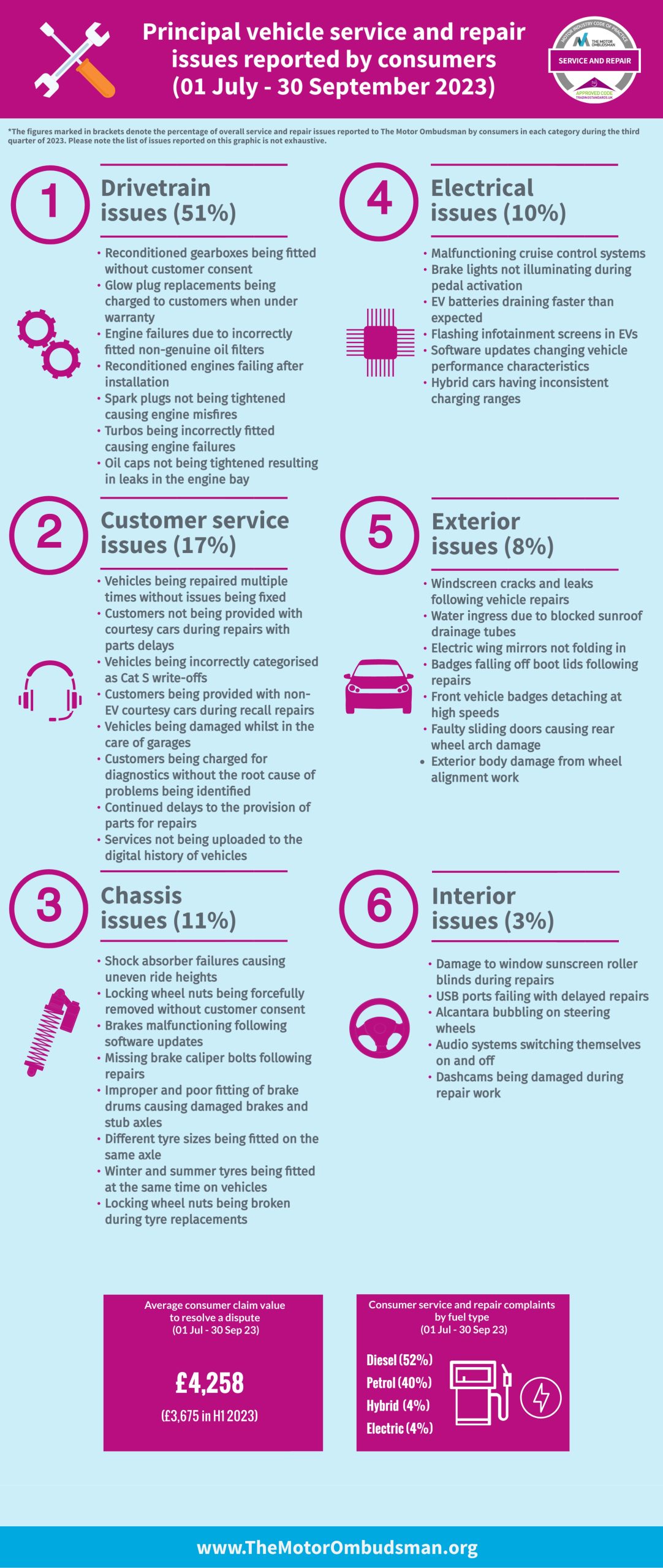The Motor Ombudsman has seen the highest volume of service and repair cases brought by consumers to its dispute resolution service in a single quarter so far this year.
Between 1st July and 30th September, the Motor Ombudsman accepted a total of 1,348 new submissions from motorists, up 10% on the second quarter of the year, and 13% more than those reported in the first three months of 2023. The number also surpasses last year’s Q3 tally by 9%.
In total, 3,763 cases have been raised in 2023, all of which fall under The Motor Ombudsman’s long-standing Motor Industry Code of Practice for Service and Repair. This has been mirrored by a record number of contacts received from consumers during the first nine months of the year, most likely sparked by the financial pressures associated with the cost-of-living crisis, and a greater likelihood to make a complaint to help recoup perceived losses, rather than a reflection of declining standards in this area of the automotive sector.
Complaints to the Motor Ombudsman
Diesel cars drove over half (52%) of the service and repair complaints in the past three months, followed by petrol models (40%), electric vehicles (4%), and hybrids (4%).
When looking at the source of service and repair complaints in the third quarter, just over half (51%) stemmed from disputes logged within The Motor Ombudsman’s “drivetrain” category, with the engine responsible for 73% of these complaints. This is followed by the transmission (15%), and the fuel and exhaust systems driving 12% of complaints respectively in this category.
Examples of concerns raised by consumers in the drivetrain area, included engine failures due to incorrectly fitted oil filters and turbos, and reconditioned gearboxes being installed on vehicles before getting customer consent.

The level of customer service experienced by consumers during a routine service or ad hoc remedial work accounted for the second highest number of disputes (17%). An element of discontent originated from factors, such as prolonged delays to repairs, sometimes without the provision of a courtesy car, vehicles being damaged whilst in the care of a business, and customers paying for diagnostic work that did not identify the root cause of the faults reported.
Issues relating to the chassis area of the vehicle, which takes in the likes of the suspension, brakes, wheels, and the steering, were responsible for just over 10% of complaints that The Motor Ombudsman has received during the last quarter. Problems highlighted by consumers, who sought help resolving their case, resulted from different tyre sizes being fitted on a single axle, and cars having winter and summer tyres at the same time. Other disputes related to shock absorber failures causing uneven ride heights, and brakes malfunctioning following software updates.
Electrical issues (10%) were also a cause for consumer complaints during the last quarter, with cruise control systems malfunctioning, EV batteries draining faster than expected, and brake lights not illuminating during pedal activation, amongst the faults.
On the subject of the exterior (8%), bodywork defects were a cause for concern, with consumers reporting dissatisfaction about paint blistering and poor quality repairs. There were equally failures of external fixtures, such as electric wing mirrors not folding, EV charging flaps not closing, and sliding doors causing rear wheel arch damage. Complaints concerning the interior of vehicles (3%) ranged from Alcantara bubbling on steering wheels, to repairs causing window sunscreen roller blinds and USB ports to stop functioning.
Resolutions requested
During the third quarter of 2023, the three most requested resolutions stated by the majority of consumers to help bring their dispute to a close, were a free of charge repair (28%), followed by compensation (25%), and a full refund (22%). Where a monetary value was attributed by consumers to their preferred resolution when submitting their case to The Motor Ombudsman, this stood at an average of £4,258, an increase of 16% versus the figure of £3,675 seen for the first six months of 2023.
“This year has seen a notable uplift in the volume of contacts received from consumers, and the number of cases accepted with regards to a service or repair,” commented Bill Fennell, Chief Ombudsman and Managing Director of The Motor Ombudsman. “With the rising costs to maintain and keep a car on the road, combined with other significant financial pressures on households, this is driving a greater likelihood to make a complaint.
“With the current trend showing no let-up in the volume of cases accepted by our service, we expect to receive in excess of 5,000 service and repair disputes by year-end, and as we look ahead to the coming months, 2024 is likely to follow a similar trend according to current projections.”




You must be logged in to post a comment.